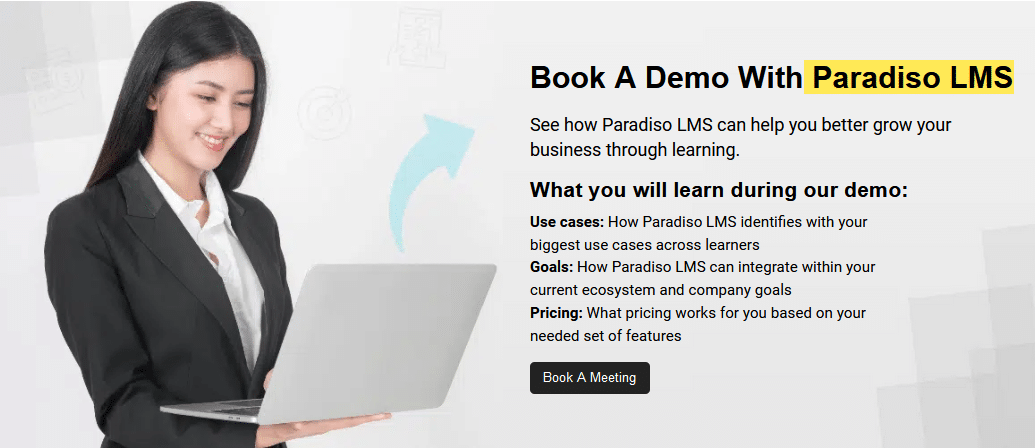Employee training is no longer a standalone activity—it’s an integral part of organizational growth and adaptability. While a Learning Management System (LMS) forms the backbone of your training efforts, its real potential is unlocked when it seamlessly connects with the other tools and systems your organization relies on. LMS integrations transform isolated learning platforms into interconnected hubs that enhance efficiency, engagement, and effectiveness.
LMS Integrations to achieve Employee Training and Development

Integrating your LMS with HR software, communication platforms, and analytics tools creates a cohesive environment where data flows smoothly, processes are automated, and learning experiences are enriched. This interconnected approach streamlines administrative tasks and provides deeper insights into employee development, helping you tailor training programs that truly resonate.
In the following sections, we’ll delve into the pivotal role of LMS integrations in employee training and development. We’ll examine how these connections can streamline your training processes, foster better collaboration, and ultimately contribute to building a more skilled and agile workforce.
What Are LMS Integrations?
LMS integrations involve connecting your Learning Management System with other software applications used in your business. This connection allows for seamless data exchange and communication between systems. Integrations can range from linking your LMS with Human Resources (HR) systems, Single Sign-On services, webinar tools, APIs, and more. These integrations enhance the functionality of your LMS, making it a more powerful tool for training and development.
Why LMS Integrations Are Crucial for Employee Training
Integrating your LMS with other systems is essential for several reasons:
- Efficiency:Automate repetitive tasks like user enrollment and data entry, saving time and reducing errors.
- Enhanced Reporting:Gain deeper insights into training effectiveness by combining data from multiple sources.
- Improved User Experience:Minimize the need to switch between different applications to provide a seamless learning experience for employees.
- Collaboration:Foster better teamwork by integrating communication and collaboration tools with your LMS.
- Security:Strengthen security measures through integrations like Single Sign-On, reducing password fatigue and IT support needs.
How Integration Helps LMS to Improve Employee Training and Development
Integrations amplify the capabilities of your LMS in the following ways:
- Automated Enrollment: Syncing with HR systems ensures new employees are automatically enrolled in mandatory training, and departing employees are removed promptly.
- Personalized Learning Paths: Access to detailed employee data allows for tailored training programs that meet individual development needs.
- Real-Time Notifications: Integrations with communication tools enable instant updates on training progress, deadlines, and achievements.
- Simplified Access: Single Sign-On integrations make it easier for employees to access training materials without remembering multiple passwords.
- Enhanced Engagement: Integrating webinar and collaboration tools facilitates interactive learning sessions, increasing engagement and knowledge retention.
List of LMS Integrations for Employee Training and Development
Single Sign-On (SSO)
SSO allows employees to access multiple applications, including your LMS, with one set of login credentials, typically their work email or employee ID. This integration simplifies the login process, reduces password fatigue, and enhances security. Popular SSO providers include Microsoft Azure AD, Google Workspace (formerly G Suite), and Okta.
HR System Integration
Connecting your HR system with your LMS ensures employee data synchronization across both platforms. New hires are automatically added to the LMS and enrolled in necessary courses while departing employees are removed. This integration saves time, reduces manual data entry, and minimizes errors. It also keeps up-to-date training records with titles, departments, and histories.
API Integration
Application Programming Interfaces (APIs) enable developers to interact with your LMS programmatically. With API integration, you can automate tasks such as creating user accounts, enrolling users in courses, and retrieving training data. APIs allow for customization and flexibility, making it possible to tailor the LMS to your organization’s specific needs.
Learning Record Store (LRS) Integration
An LRS stores learning records gathered from various systems, including your LMS. Integrating an LRS allows you to collect, store, and analyze detailed learning data using the Experience API (xAPI). This integration provides more comprehensive reporting options, making training data more accessible and actionable. Well-known LRS platforms include Yet Analytics, Learning Locker, and Watershed LRS.
Webinar Tools Integration
Integrating webinar tools like Zoom, GoToWebinar, or Adobe Connect with your LMS streamlines the delivery of live training sessions. You can schedule webinars, manage registrations, and track attendance directly within your LMS. This integration saves time by reducing repetitive tasks and consolidating training data in one place.
Webhooks
Webhooks are automated messages sent from your LMS to other applications when specific events occur, such as course completions or failed exams. They provide real-time notifications, informing you about important training milestones without constantly checking the LMS. Webhooks can be customized to trigger actions in other systems, enhancing automation and responsiveness.
Conclusion
Integrating your Learning Management System with the tools your team already uses isn’t just about technology—it’s about making employee training more effective and engaging.
Connecting your LMS with HR software, communication platforms, and analytics tools creates a seamless learning environment that saves time, reduces manual tasks, and provides deeper insights into your employees’ development. This approach turns training into a dynamic part of your organization’s growth, benefiting your team and business goals.
Take the next step with Paradiso and experience the difference a connected learning ecosystem can make.













